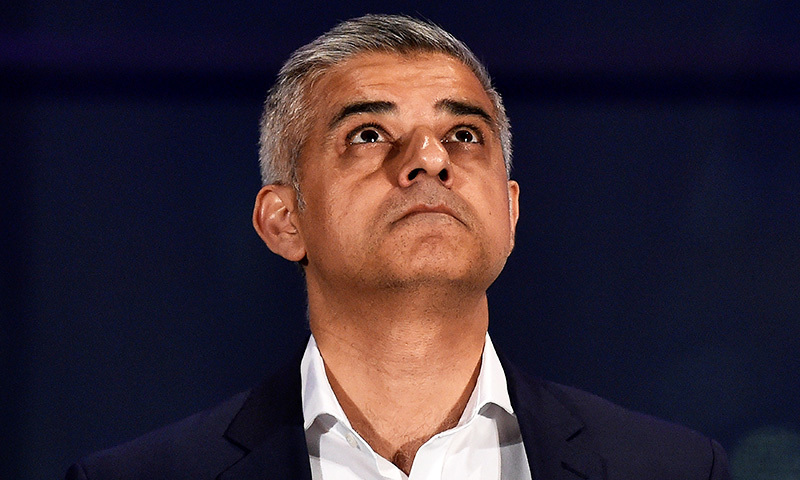So far Sadiq Khan’s name and life story mean little outside Britain. The man who is the new mayor of London is unknown in Europe. He should not be. As they tear their hair out over the massive arrival of refugees and migrants, Khan’s story should help set the record straight on immigration, integration and European Muslims.
The former human rights lawyer and the son of a bus driver from Pakistan may not see himself as a role model for the million plus Muslims who have entered Europe in search of shelter, safety and jobs.
But he should. And so should the many other European Muslims — whether practising or not — who are proud Britons, French, Dutch, German or Belgian. Because unless their stories are told and retold, the pervasive narrative of Muslims as “the other”, as aliens who can never become “true” Europeans will go on and on.
The counter-narrative to the anti-Muslim discourse is more imperative than ever. It is needed to ensure that as European governments struggle to deal with the challenge of receiving the newcomers, including thousands of children, their focus is not just on the misfits and extremists but on the millions of Muslims who are an integral part of Europe’s politics, society and economy.
If not, too many Europeans will stay entangled in a negative and often toxic conversation about Islam and Muslims.
Certainly, the increasingly virulent — and increasingly popular — Far Right parties see the unwanted newcomers as a threat to Europe’s values and to European security. Many governments in Eastern Europe make no secret of their fear of Islam.
The anti-Islam rhetoric has already seeped into the political mainstream. Talk to any European policymaker and the discussion soon turns to Muslims and their “failure to integrate”. Attitudes of Muslims towards women and gays are often cited as one glaring example of the disconnect between “real” Europeans and Muslims.
The recent tragic terror attacks in Paris and Brussels have led to further vilification of Muslims as terrorists and misfits.
See: After Paris, fear and love for Muslims
In a bitter election campaign, Khan had to fight off repeated allegations from his Conservative Party opponents of his alleged links with Muslim extremists.
European Muslims are members of several European governments, especially at city and municipal levels. Rotterdam’s mayor Ahmed Aboutaleb has won accolades for running the city since 2009. There is a handful of EU officials and members of both the European and national parliaments who are Muslims. Like former One Direction singer Zayn Malik, European Muslims are doing well in the arts, sports and business.
Their experiences need to be part of a new narrative on integration. Such an exercise will require determination and vision, good arguments backed up by facts and better — much better — communication.
It means moving from talking about “us” and “them” to a more inclusive language of living in a shared space, with shared concerns and interests and, yes, even shared values.
Developing a new “European immigration story” requires the joint efforts of politicians and policymakers, scholars as well as thought and religious leaders, civil society organisations, business representatives and the media. It means highlighting that Europe is a truly diverse continent which celebrates all its citizens, regardless of race and religion and recognises that if it is to compete on the global stage, it needs to capitalise on the talents of all its citizens.
The message should be clear: integration is a two-way street, requiring adjustment efforts by migrants and host societies. Newcomers must abide by existing rules so that they can become part of the conversation. But in exchange they should be accepted as full-fledged members of society.
Read: Muslim women must learn English or be deported: British PM
Integration can be a long and difficult process. There is no silver bullet to ease or speed up the process. Some form of affirmative action or support for higher education and facilitation of job promotion is needed to encourage minorities to become active social participants.
The EU institutions can contribute to changing the narrative on immigration by making a determined effort to recruit and promote men and women from migrant communities. Such measures could be based on the EU’s relatively successful policy on gender equality. With European Parliament elections scheduled for 2019, the EU assembly should make sure that ethnic minority politicians are included on their voting lists.
Integration requires a “whole of society” approach. Canada’s large-scale and ambitious immigration strategy has demonstrated that tools ranging from sports clubs to church and mosque-related activities have a powerful influence on the absorption of younger immigrants into the societies of host countries. The role of local authorities is especially important.
Many major international and national companies are contributing to national and international efforts to provide shelter, food, water and medical care to refugees. They also need to become more proactive in offering internships, training programmes and permanent jobs to refugees. This will require more intensive coordinated efforts to match the skills and educational qualifications of refugees with job vacancies.
Relaxation of laws which prohibit asylum-seekers from working are needed so that companies which are interested in offering full-time jobs to refugees are not deterred by the risk of deportation.
Above all, stories of successful integration are desperately needed to help change the current negative conversation on Islam and Europe.
The writer is Dawn’s correspondent in Brussels.
Published in Dawn, May 7th, 2016















































